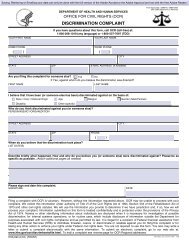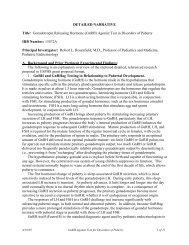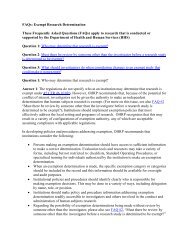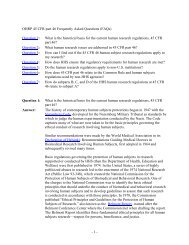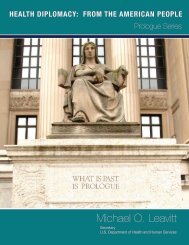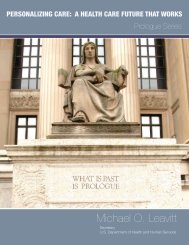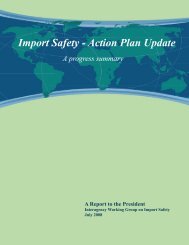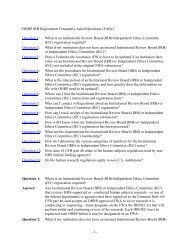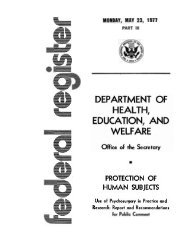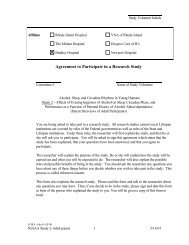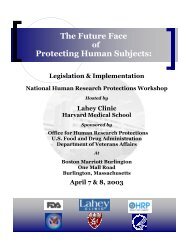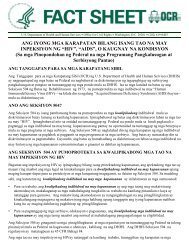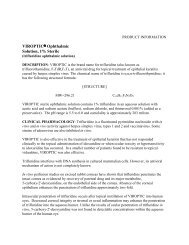OHRP Compliance Oversight Common Findings - HHS Archive
OHRP Compliance Oversight Common Findings - HHS Archive
OHRP Compliance Oversight Common Findings - HHS Archive
You also want an ePaper? Increase the reach of your titles
YUMPU automatically turns print PDFs into web optimized ePapers that Google loves.
(c) Section 46.116(b)(5): A statement that significant new findings developed during the course of<br />
the research which may relate to the subject’s willingness to continue participation will be provided<br />
to the subject.<br />
(36) ICD Language too Complex. <strong>HHS</strong> regulations at 45 CFR 46.116 require that informed consent<br />
information be in language understandable to the subject or the subject’s legally authorized<br />
representative. <strong>OHRP</strong> is concerned that the informed consent document approved by the IRB for this<br />
study appeared to include complex language that would not be understandable to all subjects.<br />
(37) Exculpatory Language in ICDs. <strong>HHS</strong> regulations at 45 CFR 46.116 prohibit any exculpatory<br />
language in informed consent through which the subject is made to waive, or appear to waive, any of<br />
the subject's legal rights. <strong>OHRP</strong> finds the following language in the IRB-approved informed consent<br />
documents to be exculpatory: [cite language].<br />
(38) Standard Surgical Consent Documents Lack Required Elements of Informed Consent. <strong>OHRP</strong><br />
notes that standard surgical consent documents rarely include all the elements required under <strong>HHS</strong><br />
regulations at 45 CFR 46.116. Reliance on such documents for research generally requires formal<br />
waiver of consent requirements in accordance with Section 46.116(d), which requires that the IRB find<br />
and document four specific conditions. <strong>OHRP</strong> finds no documentation of such waiver in protocols for<br />
which surgical consent was accepted in lieu of an IRB-approved research consent document.<br />
(39) Inappropriate Boiler Plate ICDs. <strong>OHRP</strong> is concerned that the boilerplate informed consent<br />
document is difficult to understand and contains information that may be irrelevant for certain research.<br />
(40) Enrollment Procedures did not Minimize Possibility of Coercion or Undue Influence. <strong>OHRP</strong> finds<br />
that the procedures for enrolling subjects failed to minimize the possibility of coercion or undue influence<br />
as required by <strong>HHS</strong> regulations at 45 CFR 46.116.<br />
Additional <strong>OHRP</strong> Guidance<br />
(41) Informed Consent for Research in Emergency Situations. Nothing in the <strong>HHS</strong> regulations at 45<br />
CFR Part 46 is intended to limit the authority of a physician to provide emergency medical care, to the<br />
extent the physician is permitted to do so under applicable Federal, State, or local law. However,<br />
when emergency medical care is initiated without the physician obtaining and documenting the legally<br />
effective informed consent of the patient or the patient’s legally authorized representative for<br />
participation in humans subject research (unless the IRB has appropriately waived such requirements or<br />
found that the research is consistent with the Secretary’s waiver for emergency research, see OPRR<br />
Reports, 97-01 at URL http://ohrp.osophs.dhhs.gov/humansubjects/guidance/hsdc97-01.htm), the<br />
patient may not be considered a research subject under 45 CFR Part 46. When emergency care<br />
involves investigational drugs, devices, or biologics, U.S. Food and Drug Administration requirements<br />
must be satisfied.<br />
<strong>OHRP</strong> <strong>Compliance</strong> Activities: <strong>Common</strong> <strong>Findings</strong> and Guidance (7/10/2002)<br />
Page 10 of 20




